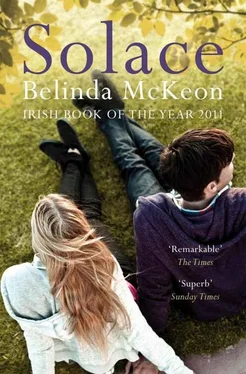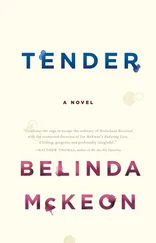‘The son?’
‘Yes, the son, obviously,’ Mona said, turning around with an expression of disbelief. ‘He’s only our client, for Christ’s sake!’
‘Sorry,’ Joanne said. ‘Wasn’t thinking. Not fully awake.’
Mona took a small mirror from her desk drawer and checked her makeup; seeming to see some flecks of mascara beneath her eyes, she brushed at them with the quick, delicate strokes of a fingertip. ‘God, I’ve been awake since six,’ she said. ‘I hate dragging myself to the gym, but what can you do?’
‘I don’t know,’ Joanne said vaguely, and looked down to the page in front of her, back to Elizabeth’s words. Clearly, they just meant so much more to me than to him , she was saying. She was talking about the Sunday afternoons in the mews. Her counsel had asked Elizabeth whether she now suspected those afternoons merely to have been part of a ruse, and Elizabeth was saying, no, that she did not think that, that she could not think her son, back then, capable of such deceit. Such capability came later, her counsel offered, and Elizabeth, then, said nothing at all.
‘Actually, it was Rupert’s new restaurant I ate in on Saturday night,’ Mona said now.
‘Nice,’ said Joanne, with what she hoped would be enough enthusiasm to satisfy Mona.
‘God, omakase to die for. Rupert says it’s as good as anything you’ll get in New York.’
‘You met Rupert in the restaurant?’
Mona looked around and gave Joanne a frown that suggested she really wasn’t keeping up. ‘I was with Rupert at the restaurant. He invited me. He said it was important for us to know the kind of establishment he runs.’
‘Oh,’ Joanne said, as evenly as she could. Mona’s little crush on the Lefroy son had been evident for a while now. Joanne didn’t think Mona could be sleeping with him — she couldn’t be that stupid: word would spread, it would hobble her career — but she was definitely past the point of professional objectivity, flirting with him on his visits to the office, joking with him on the phone. It was nothing new: any guy with a whiff of power seemed to get her going. It was something, maybe, that Joanne should have a word with her about — a friendly word, a word to prevent Mona from making herself look unprofessional in front of Imelda and Eoin — but, then, Joanne and Mona were not friends. If they were friends, Joanne would surely not have been doing, in her head, what she had been doing at some level all morning: mentally retelling the story to Mark. Picking out the moments, mimicking the sentences, ramping up the details, so that in her mind she saw him laugh, or exclaim, or shake his head in wonder or enjoyment or incredulity; saw him watch her as she told him the story, saw him like her for it, all the more. ‘She sounds like a dose,’ she imagined Mark saying of Mona, and she saw herself smiling, and eating another forkful of the dinner they would be having together, and taking a sip from her glass of wine.
‘Rupert’s huge into sushi,’ Mona said then, and Joanne imagined the mileage she and Mark would get out of this statement, and how much he would appreciate that she could make that kind of joke, and then he would make a joke of his own about it in return. Though, on second thoughts, that might be awkward.
‘Have you been to the other restaurant?’ she asked Mona, because she wanted, somehow, to shake all of these images — Rupert, Mona, sushi, Mark’s jokes about sushi — out of her head. Then, as an afterthought, more to herself than to Mona, she said, ‘It’s not a sushi restaurant as well, I hope.’
‘Nope,’ Mona said. ‘It’s fusion. And it’s gorgeous . I mean, it’s obvious he did the right thing with the place. I can’t imagine how that old witch thinks she has a ghost of a chance to win.’
Rupert Lefroy had lived in his mother’s mews all the way through his time at Trinity, and for a couple of years afterwards, while he tried to make a name for himself writing on politics for one of the Sunday newspapers. But he lacked discipline — he had admitted as much himself, in his first meeting with Eoin — and soon even the friends of his father who had been putting work his way tired of his disregard for deadlines, and of the signs, which displayed themselves more and more blatantly with every piece he wrote, that his grasp of politics, not to mention political history, was extremely selective. He moved to London and, with the bulk of his inheritance from his father, opened a restaurant in Knightsbridge, which within five years had made him ‘moderately wealthy’, he told Eoin. He had married a model — a catalogue model, actually: Joanne had googled her — bought a Jaguar (no googling required) and built a country house that had involved some complicated and very expensive levelling work on a field in the Cotswolds. Within another five years he was divorced, almost bankrupt, and hatching plans for a return to Dublin, which was then in the first flush of the boom.
Joanne had read both sides of the rest of the story, from the court transcripts, but it was Elizabeth’s version that had stuck in her mind: delighted to see Rupert home, she had agreed readily when he explained that, for tax reasons, it would be of enormous benefit to him to be able to claim the mews as his own. He would be living in it, he had promised her, and he would not be using it for anything else; certainly for nothing commercial. The lease he had had his own solicitor draw up had included this condition, he assured her. She had trusted him, and she had not felt the need to read through the final draft of the lease, and shortly after signing it, she had woken one morning to find a demolition crew setting up in her yard and roaring at her, when she ventured out her door, to get back into the house. When the new restaurant opened a few months later, its design was hailed as a triumph of modern sophistication, mainly, Elizabeth added, by the publicists Rupert had hired to secure him ample coverage in the Dublin papers. But for her own part, she said, she had stood at her window and wept as she watched the brick walls come down and, later, the glass walls go up; watched them carry into the place a ‘ghastly’ steel spiral staircase without a banister. It was her one small comfort, she said, that some people from the Health and Safety Authority had forced Rupert to put a banister on the staircase after all, but it was still ghastly. And the restaurant was not a place into which she would ever venture; not that she would ever be invited. She had declared her intention to sue almost as soon as the demolition crew had gone for lunch that very first day, and she and Rupert had not shared a civil word since. It was, she said, a source of unspeakable pain to her. But she did not know what else to do.
When she read that detail in the transcript, about the lack of an invitation, Joanne had hesitated over whether to include it in the case notes. Whether or not Elizabeth felt welcome in the restaurant was, after all, beside the point. The question was whether Rupert Lefroy had tricked his mother into signing away her rights to keep the mews house the way it had always been.
‘And he’s put all these absolutely divine paintings on the walls,’ Mona said. ‘None of your Graham Knuttels.’
‘Right,’ Joanne said lightly, and typed a few nonsense words on to her screen, signalling with the clatter of her keyboard that the exchange was over, and that it was time to disappear into the wordless hum of work in which they were both expected to be immersed every morning when Eoin and Imelda arrived.
‘Well, rather you than me, reading that old windbag,’ Mona said, and she turned back to her screen.
*
Waking up that morning had not been among the more pleasant experiences in Mark’s life. It wasn’t the hangover, though certainly that was bad enough; he had agreed, after coming home from the party on Sunday morning, with Mossy’s suggestion that they postpone the inevitable by heading to an early-house. So, the hangover was atrocious, but the hangover was not what was causing him to cringe: it was the fact of what he had done the night before, turning up plastered on Joanne’s doorstep, falling into her house, collapsing into Christ knew what kind of a flailing, snoring, farting mess on her couch. He had no memory of having been awake on the couch the night before, even for a couple of minutes. Joanne had said, when she had brought him in a cup of tea that morning, that they had talked for a while before he ‘dozed off’, as she so delicately, so sweetly, put it; but when he asked her what they had talked about she had just given him a sort of teasing shake of the head, told him that she knew all his secrets, and then gone around the room, picking up folders and stuffing them into her handbag and cursing about the creases in her suit. And then she had left.
Читать дальше












